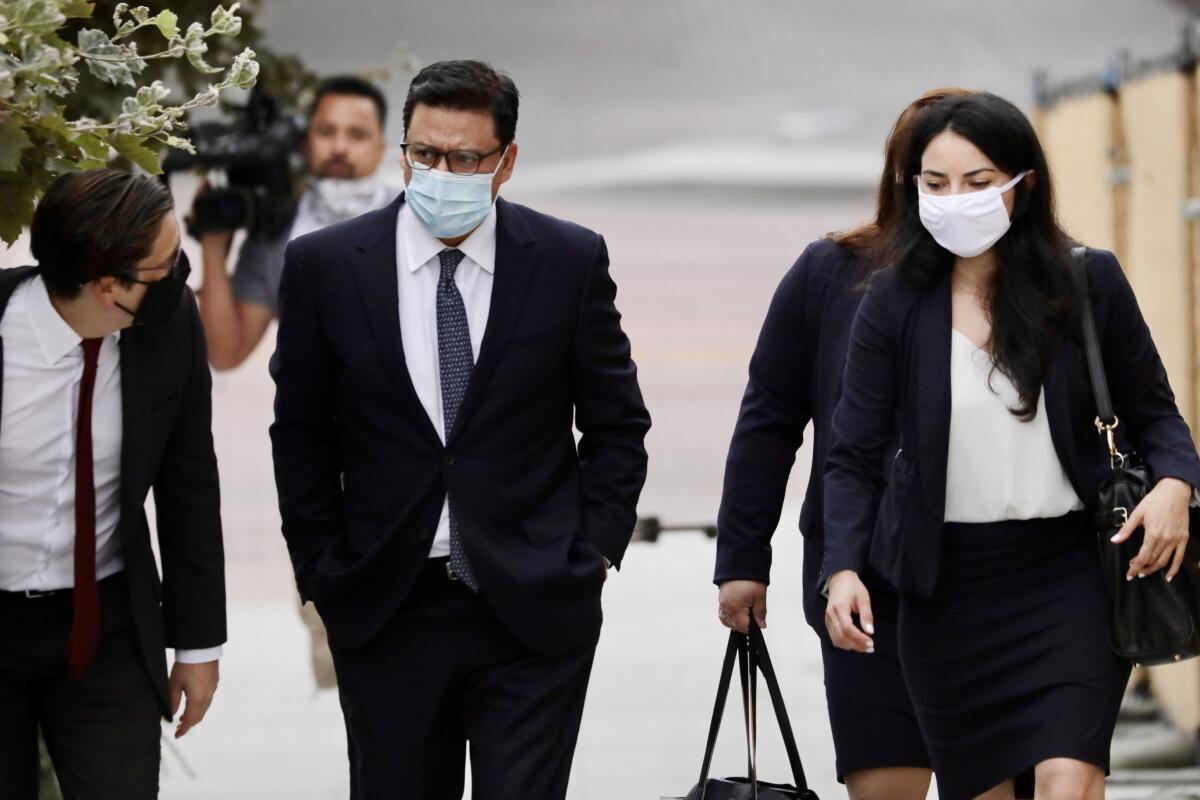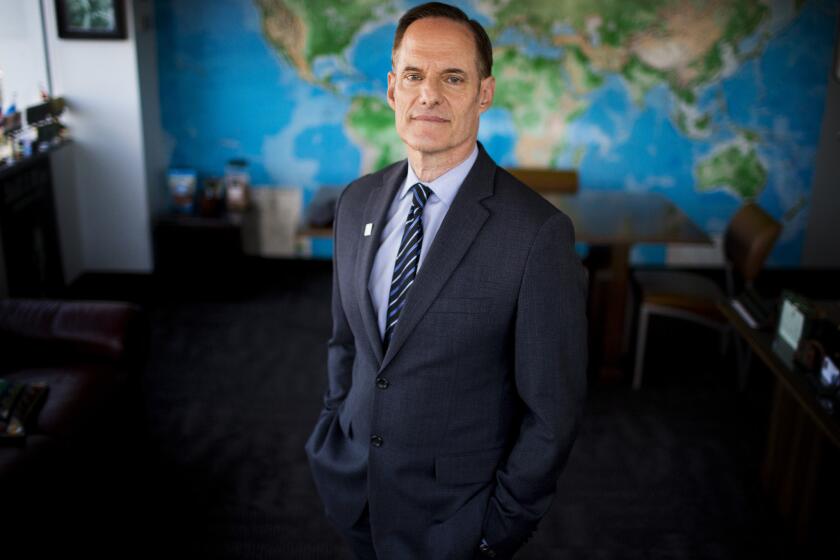Huizar’s relatives not expected to face charges in corruption probe, prosecutor says

A federal prosecutor said Wednesday that his office does not intend to charge family members of Los Angeles City Councilman Jose Huizar, identifying them as witnesses rather than targets of the ongoing pay-to-play probe.
Three members of the Huizar family — his wife Richelle, his mother Isidra and his brother Salvador — are mentioned repeatedly in the 113-page indictment against the councilman, who has pleaded not guilty to bribery, money laundering, racketeering and other charges.
Prosecutors have alleged that Huizar family members laundered his bribe proceeds, receiving cash from the councilman and then paying his bills. They also claimed that Huizar’s wife, who has not been named by prosecutors but is easily identifiable from details in the criminal complaint and various plea deals, attended a meeting to discuss a real estate consulting agreement that prosecutors later characterized as an “indirect bribe.”
During Wednesday’s trial-setting hearing, Asst. U.S. Atty. Mack Jenkins told a judge that, based on the information his office currently has, he does not expect to charge the three Huizar family members. And he indicated that Huizar’s wife, who had no experience or knowledge in real estate, did not get involved in the consulting arrangement.
“[She] declined to participate because she thought it was suspicious,” Jenkins said.
The hearing marked the first time that Huizar, the subject of a 34-count criminal indictment, appeared in person at a hearing in the ongoing corruption case.
Prosecutors have accused the councilman, who was first elected to his post in 2005, of heading a criminal enterprise involving bribes from real estate developers looking to build in his district and from a businessman seeking introductions to such developers.
Wearing a dark suit and a face covering, Huizar strode out of the courthouse Wednesday without commenting and quickly climbed into a waiting car. His lawyers also declined to comment.
The hearing, which lasted roughly two hours, offered some additional details about the case, including:
— Prosecutors are preparing hundreds of exhibits and intend to call 40 to 50 witnesses, with a jury trial lasting 15 to 20 days.
— Jenkins said Huizar, while on a trip to Las Vegas funded by a Chinese real estate developer, was captured on video with $60,000 in casino chips. He was approached by a casino employee who wanted to make sure Huizar was using his own money, Jenkins said.
— When the employee asked Huizar to fill out an identification form, the councilman declined and immediately left the table, leaving his gambling chips behind, Jenkins alleged.
— Jenkins identified another real estate developer, who allegedly agreed to give Huizar a $500,000 bribe, as David Lee. The Times has previously reported that one of the downtown development projects in the case is a 20-story residential tower being developed by Dae Yong Lee, also known as David Lee.
Lee’s attorney, Ariel Neuman, had no comment on Wednesday. Previously, he has stated that Lee is cooperating and looks forward to “a swift resolution clearing his name.”
AIDS Healthcare Foundation has sued L.A. to stop developments vetted under Councilman Jose Huizar or former Councilman Mitchell Englander from moving forward.
U.S. District Judge John F. Walter set a trial date of Sept. 29 but characterized it as merely a “placeholder.” He voiced doubts about whether Huizar, who was suspended from the council in June and is no longer getting a city paycheck, financially qualifies for the services of the federal public defender, which represented him at Wednesday’s hearing.
Walter also expressed some skepticism about aspects of the U.S. Attorney’s case.
Jenkins told the federal judge that one of the benefits provided by Huizar in exchange for bribes were official city resolutions that offered praise for businessmen and their accomplishments. Walter questioned whether such documents would be worth thousands of dollars in bribes.
“I’m having a hard time seeing a real benefit,” he said.
Walter also asked Jenkins whether Huizar could argue that he approved a particular real estate project not because he received personal financial benefits but because the project was good for the city.
Jenkins said the question of whether a project is beneficial to the community is “ultimately irrelevant.” And he argued in at least one case, Huizar acted in a way that would not be viewed as beneficial — helping a developer reduce the amount of affordable housing in his project, saving the company $14 million.
More to Read
Sign up for Essential California
The most important California stories and recommendations in your inbox every morning.
You may occasionally receive promotional content from the Los Angeles Times.













